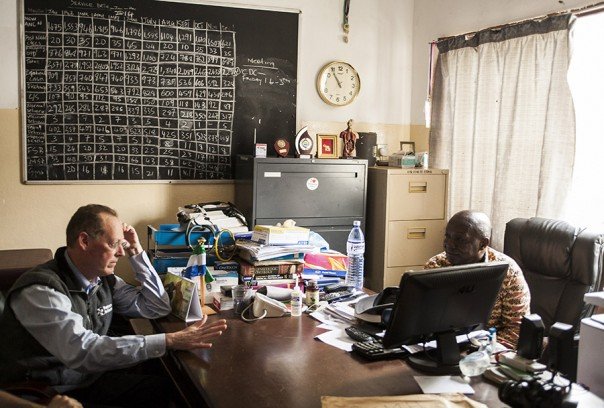By Maya Brownstein | Annual Giving Assistant
Above: PIH co-founder Dr. Paul Farmer and Dr. AP Koroma discuss maternal health in Sierra Leone on April 6, 2015. Koroma is the medical superintendent at Princess Christian Maternity Hospital in Freetown.
Thank you so much for supporting Partners In Health and our work to fight Ebola and strengthen the already-weak health systems it destroyed in West Africa. Foreign Policy recently published an article about Ebola’s devastating, long-term toll on maternal and child health in Sierra Leone. We're happy to share an excerpt of this story that highlights the importance of PIH's contuinued commitment to Sierra Leone, and we encourage you to read the full article by clicking the link below.
The deadly virus that motivated billions of dollars in international aid has killed nearly 4,000 people in Sierra Leone. (Total infections in the country as of Nov. 22 were 14,122.) The number of children under age 5 who die each year from other causes is 10 times that.
Yet there are signs that the two trends are dangerously intertwining — that the ravaging toll Ebola has taken on Sierra Leone’s health-care system may mean even more mothers and children will die in years to come.
As Ebola crowded out other health concerns in 2014, the country’s already tremulous health infrastructure fell apart. “Sierra Leone is still struggling to emerge from the ravages of a devastating war,” says Anders Nordstrom, representative to Sierra Leone from the World Health Organization (WHO). “The Ebola outbreak has added strain to an already fragile system.”
In November 2014, six months after the country’s first Ebola cases were documented, the WHO reported that “few patients have access to healthcare facilities, with many facilities closed.” Many health workers died or quit out of fear. Attendance at clinics dropped by as much as 90 percent, the WHO report found. Frightened parents kept their children home with life-threatening diseases. Vaccination programs that were only just starting to effectively combat other killers, such as measles and Lassa fever, were decimated. As a result, local doctors and international NGOs, including Care USA, estimate that for each person Ebola has killed through direct infection, more than one Sierra Leonean will perish from the secondary effects of the crisis.
Links:
Project reports on GlobalGiving are posted directly to globalgiving.org by Project Leaders as they are completed, generally every 3-4 months. To protect the integrity of these documents, GlobalGiving does not alter them; therefore you may find some language or formatting issues.
If you donate to this project or have donated to this project, you can receive an email when this project posts a report. You can also subscribe for reports without donating.
